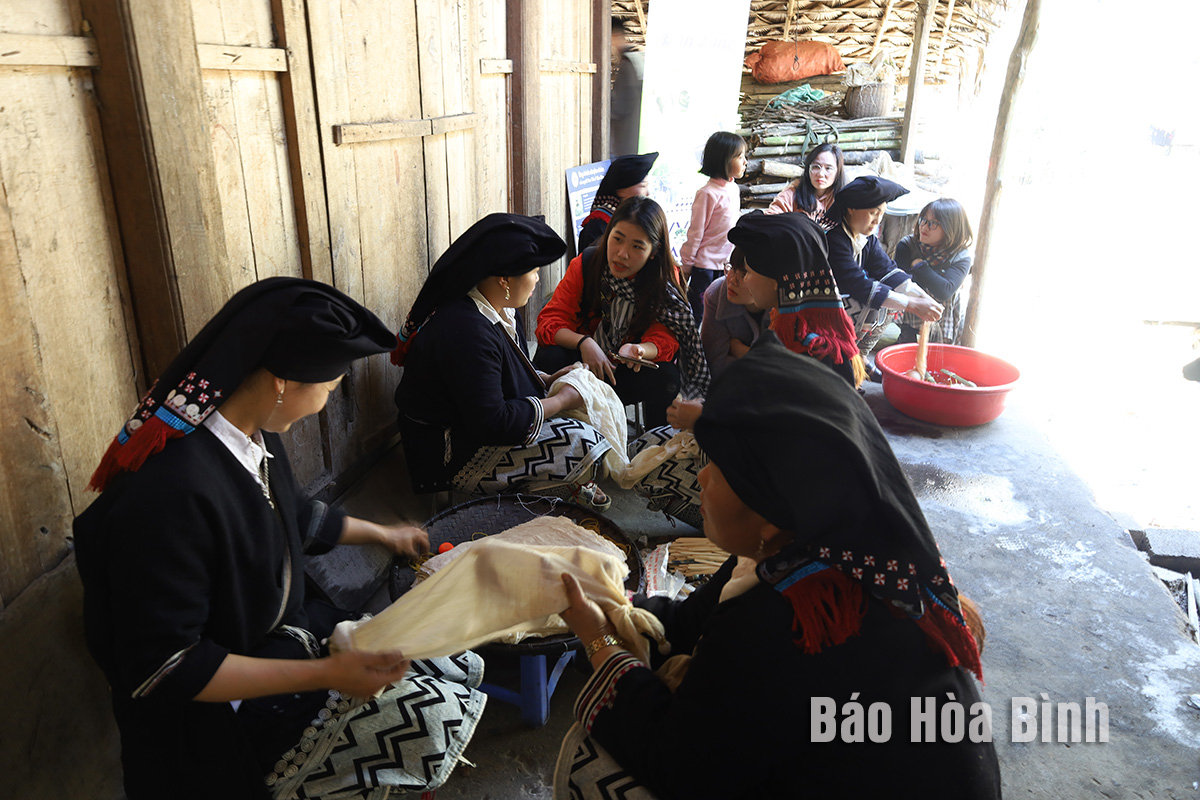



Members of the traditional craft group in Sung village demonstrate the process of indigo dyeing and brocade weaving to tourists.
Twice a month, on the 1st and 15th day of every lunar month, a Dao script class is held in the village, with three local teachers who are fluent in the Dao writing system taking turns to instruct students. The class is open to participants of all ages, from children to the elderly. The aim is to preserve and pass on the writing system of the Dao people. Since its opening in 2017, this unique class has become a popular point of interest for both domestic and international visitors.
Dinh Thi Hao, Director of Da Bac Community-Based Tourism joint Stock Company, said that the Dao writing class is one of the most attractive activities for tourists in the locality. Many visitors have expressed their admiration for the efforts to preserve the Dao script of the local Dao Tien community, Hao added.
Currently, the traditional architectural style is still intact in the village. All 78 households are still living in traditional single-storey wooden houses with thatched roofs. Three years ago, a project funded by a non-governmental organisation supported the community in enhancing their capacity for sustainable living, with a focus on preserving traditional crafts. As a result, craft groups have been established in the village, including those for brocade weaving, herbal medicine, and handmade paper. Additionally, a craft village experience space has been set up, allowing visitors to witness the entire process from production to the finished product.
Hoang Duc, a local tour guide, said that he has led many foreign tourists to the community-based tourism sites in Sung village. Overall, the visitors have a very positive impression of the destination and highly appreciate the community’s commitment to preserving their culture. The villagers still wear traditional clothing and live in their original homes, which encourages many visitors to stay longer in the village for a more immersive experience, Duc explained.
According to Ly Van Nghia, head of Sung village, tourism has brought about positive changes in the local community's mindset, fostering a more open attitude towards cultural preservation. The community's awareness of preserving their traditional culture has greatly improved. The homestay businesses are continuously improving the quality of their services, offering tourists more diverse cultural experiences through accommodation, traditional cuisine, and ethnic music. Many households in the village are also participating in the model by providing services and products related to tourism, helping to improve their income and livelihoods.
The traditional cultural values of the Dao Tien people are now being turned into a series of interactive experiences, including bee wax painting, indigo dyeing, printing of patterns on handmade paper, Dao herbal baths, wine making, and meat fermenting. The community is continuously innovating its products and services, ensuring tourists have authentic and diverse experiences.
The community-based tourism programme in Sung village has also launched a cultural and historical tour that has attracted many international visitors. The 2-day, 1-night itinerary, called "Sacred Forest Footprints," offers visitors the chance to solve puzzles, decipher codes, and uncover hidden clues about the history and culture of the region. The tour includes activities such as bathing in a nearby spring or enjoying a Dao herbal bath, tasting traditional food, participating in cultural performances, and learning the traditional "cheo” dance of the Dao Tien people. After spending the night at a homestay, guests can take a leisurely walk around the village, learn about the daily life of the locals, discover the process of making handmade paper, and even create their own artwork on paper made from trees and flowers in the garden.